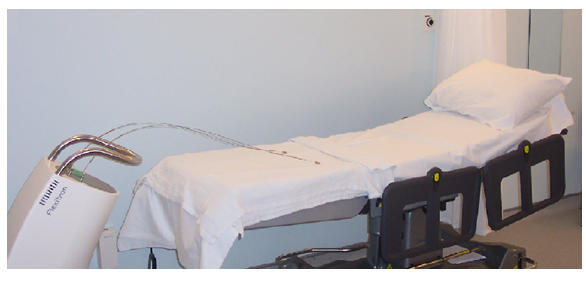- Reference Number: HEY-037/2019
- Departments: Oncology (Cancer Services), Radiotherapy
- Last Updated: 31 July 2019
Introduction
This leaflet has been produced to give you general information about your treatment. Most of your questions should be answered by this leaflet. It is not intended to replace the discussion between you and your doctor, but may act as a starting point for discussion. If after reading it you have any concerns or require further explanation, please discuss this with a member of the healthcare team.
What is Brachytherapy?
Brachytherapy is a form of radiotherapy where a radioactive source, iridium, which is stored and delivered via a treatment machine, called a Flexitron. The radioactive source is placed close to the tumour or post operatively placed near the scar in the vagina. The purpose of this technique is to deliver a direct dose to the area concerned, minimising the dose to the normal surrounding tissue. The radioactive source is only active when the Flexitron is switched on therefore you will not be radioactive to any other person after treatment.
Where is the Brachytherapy Suite?
When you attend for your treatment, you will need to check in at the Brachytherapy Suite, which is located in the main reception of Castle Hill Hospital, Entrance 2.
For patients on hospital transport, you will be dropped off at the Queen’s Centre, from where you will be directed to the Brachytherapy Suite. Following your treatment, you will need to return to the Queen’s Centre where you will be collected by hospital transport for your return journey.
What do I need to do?
You can eat and drink normally before the procedure. We would advise you to come dressed in loose fitting clothing, ideally a dress or skirt, as you will be required to remove your underwear from the waist down. There is a private curtained area in the treatment room where you can leave your belongings. The treatment time is very short; however you may like to bring a book or magazine to read while your treatment is being delivered. If you would like to bring some music of your choice, we can provide a compact disc (CD) player.
What does the treatment involve?
Brachytherapy treatment is usually given in three to five daily treatments, on uninterrupted days Monday to Friday on an outpatient basis. Treatment time is approximately ten minutes however; your appointment times will be longer to account for treatment preparation. If you have received external beam radiotherapy, then your brachytherapy will not commence immediately; there will be a minimum gap of a few days. Appointments will be pre-booked by our booking coordinators and you will be informed by post. The Brachytherapy team will provide information prior to the procedure during your course of external beam radiotherapy. If you are having brachytherapy only, a member of the team will contact you via telephone beforehand.
Vaginal Cylinder
Before you are called into the treatment room you will be asked to empty your bladder. The first time you attend, the doctor will examine you internally to determine the required treatment cylinder. This will require you lying on the treatment couch, which is pictured further down in the leaflet. We will make you as comfortable as possible on the couch. The cylinder is lubricated and inserted into the vagina, it is possible you may experience some discomfort. Please inform the radiographers of any discomfort you experience so we can try to improve this. The cylinder (see picture below) is kept in place by a clamp attached to the treatment couch ensuring the position is maintained.
Treatment Delivery
Once the cylinder is positioned, it will be connected via a small hollow flexible tube to the Flexitron. The radioactive source travels down the hollow tube on a thin wire and stops at programmed points to deliver the planned dose. Flexitron will be switched on once the radiographers have left the room and closed the door. The radiographers can communicate with you over the intercom and will monitor you on close circuit television (CCTV). When the treatment is complete, the radiographers will enter the room and remove the cylinder. You will then be given time and privacy to freshen up and get dressed. After your treatment, the radiographers will go over the possible side-effects and will be available to answer any questions. You will see your doctor approximately 6 weeks after your treatment is complete. If you do not have this appointment on your last treatment, the radiographers can arrange this for you.
Student Radiographers
As we are a teaching hospital it is possible there may be some male and female student radiographers working with us during the time of your treatment. If you would prefer them not to be present during your treatment, please make the radiographers aware before your treatment commences.
What happens afterwards?
Acute side-effects
It is quite normal to experience slight bleeding and vaginal discharge after the treatment is completed. Other mild side-effects include diarrhoea and a burning sensation when passing urine (known as cystitis). If you are already experiencing these from your radiotherapy they should not get any worse. These can continue up to two weeks after your treatment is complete. We would advise you to drink plenty of fluids to minimise the effects but if they persist, you can contact the brachytherapy team, the gynaecology nurse specialist or GP.
Late side-effects
The treatment can cause inflammation of the vagina and dryness. The vaginal walls can lose elasticity leading to the narrowing of the vagina; this can make sexual intercourse and internal examinations difficult or uncomfortable. This can be prevented by using vaginal dilators and/or regular gentle sexual intercourse. The brachytherapy radiographers will discuss this in detail and answer any questions or concerns you may have.
Contact Numbers
If you need to speak to a member of staff regarding your appointments please ring booking office. Any other queries regarding your brachytherapy, a member of the brachytherapy team can be contacted via Radiotherapy Reception or the Brachytherapy Suite.
Radiotherapy Booking Office (01482) 461187 / 461188 / 461189
Radiotherapy Reception (01482) 461191
Brachytherapy Suite (01482) 461950 / 461951
Should you require further advice on the issues contained in this leaflet, please do not hesitate to contact the Information & Support Team on telephone number: (01482) 461206 or e-mail: hyp-tr.radiotherapy.information@nhs.net
Please find below the contact details of useful organisations that provide information about cancer including radiotherapy treatments:
Macmillan Cancer Support
Provide information from specialist nurses on all aspects of cancer and its treatment, and on the practical and emotional aspects of living with cancer.
Free phone help line: 0808 808 00 00 (7 days a week, 8am-8pm)
Online: www.macmillan.org.uk
Write to: 3 Bath Place, Rivington Street, London, EC2A 3JR
PALS (Patient Advice and Liaison Service)
Provide confidential advice and support, helping you to sort out any concerns you may have about the care we provide, guiding you through the different services available from the NHS.
Telephone: (01482) 623065 (Monday – Friday 9:00am – 4:00pm)
Email: hyp-tr.pals.mailbox@nhs.net
Macmillan Sexuality Counsellor
For queries or to arrange an appointment please contact Oncology Health Centre, Queen’s Centre, Castle Hill Hospital, Cottingham, HU16 5JQ. Telephone: (01482) 461232 / 461060
General Advice and Consent
Most of your questions should have been answered by this leaflet, but remember that this is only a starting point for discussion with the healthcare team.
Consent to treatment
Before any doctor, nurse or therapist examines or treats you, they must seek your consent or permission. In order to make a decision, you need to have information from health professionals about the treatment or investigation which is being offered to you. You should always ask them more questions if you do not understand or if you want more information.
The information you receive should be about your condition, the alternatives available to you, and whether it carries risks as well as the benefits. What is important is that your consent is genuine or valid. That means:
- you must be able to give your consent
- you must be given enough information to enable you to make a decision
- you must be acting under your own free will and not under the strong influence of another person
Information about you
We collect and use your information to provide you with care and treatment. As part of your care, information about you will be shared between members of a healthcare team, some of whom you may not meet. Your information may also be used to help train staff, to check the quality of our care, to manage and plan the health service, and to help with research. Wherever possible we use anonymous data.
We may pass on relevant information to other health organisations that provide you with care. All information is treated as strictly confidential and is not given to anyone who does not need it. If you have any concerns please ask your doctor, or the person caring for you.
Under the General Data Protection Regulation and the Data Protection Act 2018 we are responsible for maintaining the confidentiality of any information we hold about you. For further information visit the following page: Confidential Information about You.
If you or your carer needs information about your health and wellbeing and about your care and treatment in a different format, such as large print, braille or audio, due to disability, impairment or sensory loss, please advise a member of staff and this can be arranged.



